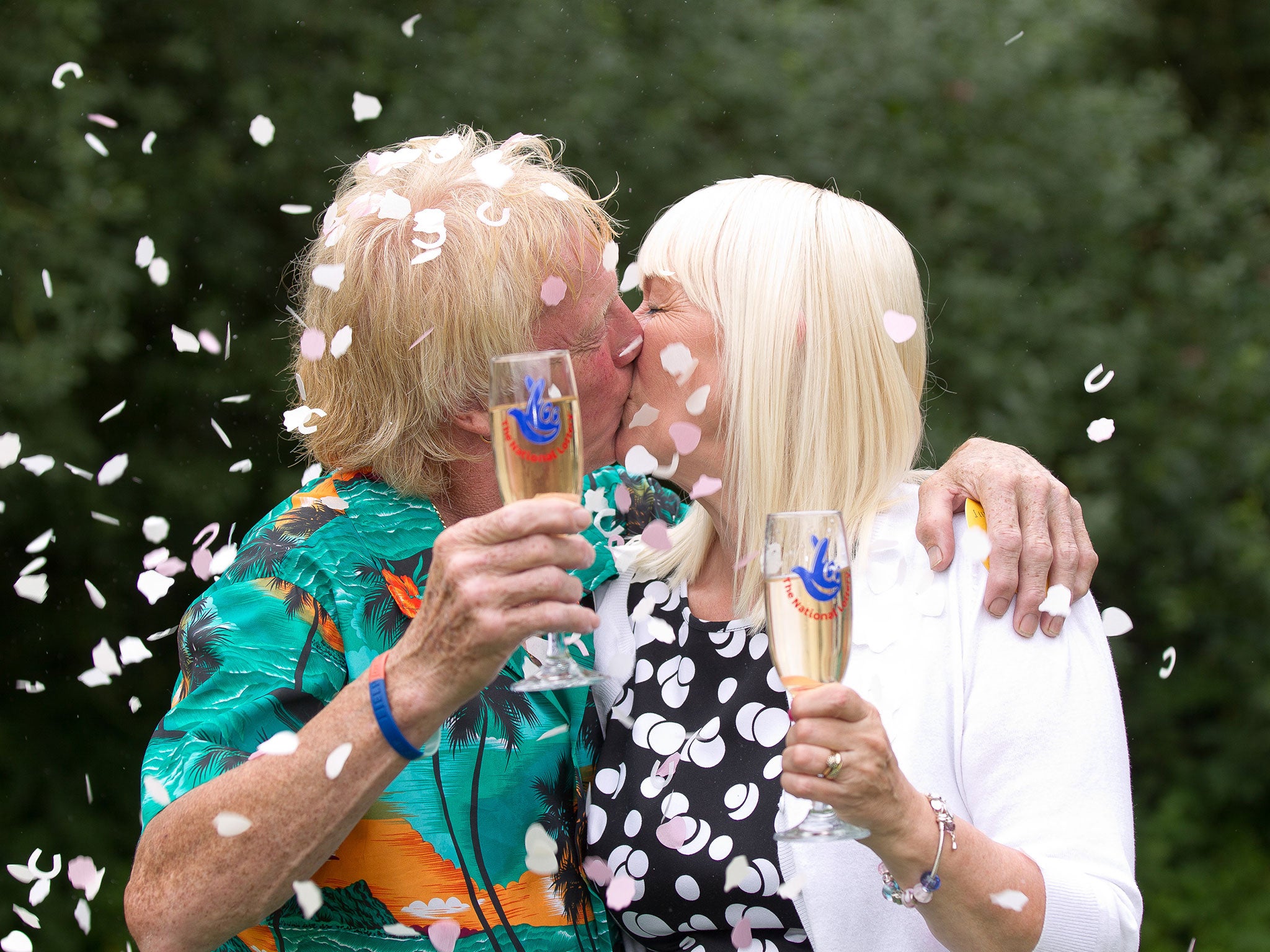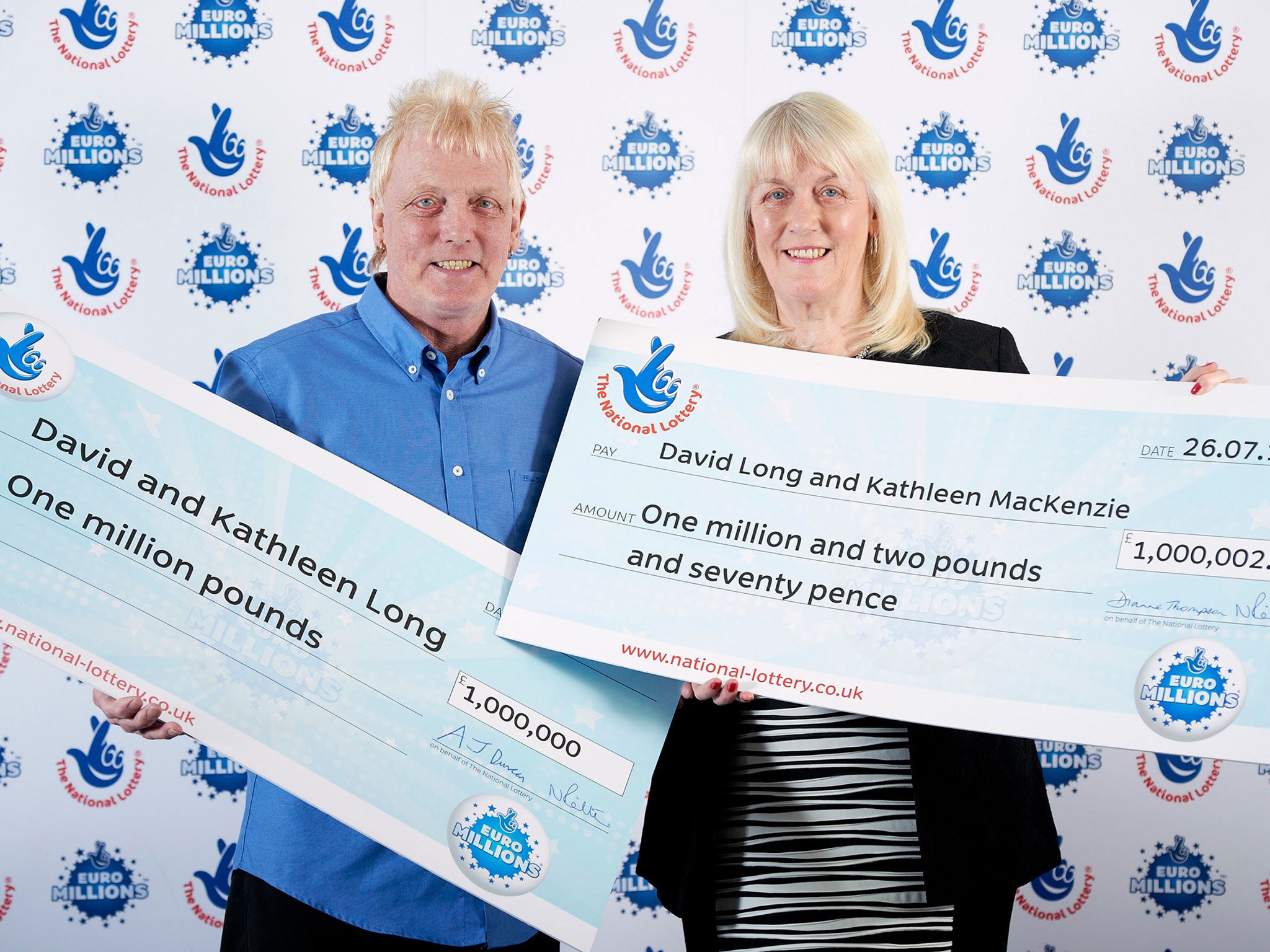Euromillions double winners: chances of winning twice might not be as slim as they seem
The actual answer all depends on what exactly you're asking

Camelot said that the probability of this happening was 283 billion to one. But yesterday, it was all over the news that David and Kathleen Long, from Scunthorpe, won the Euromillions raffle for the second time in their lives.
There was also a lot of delight at the sheer improbability of the event.But most people find it hard to think clearly about probabilities beyond tossed coins and rolled dice, so how likely was their win really, and where did the 283 billion to one number come from?
Let’s look at how Camelot calculated this probability. The Longs won the Euromillions Millionaire Raffle twice. This is a pretty straightforward raffle, much like the one conducted in village fairs, only you’re playing for a million pounds instead of a hamper of Milk Tray.
The first time they won it, 100 tickets were picked out as winners from the total number of tickets that had been bought. Camelot did not disclose this total; assume it was around 17 million on each of the two days, as this will give you something like the final figure. So the probably of them winning on that day was 100 out of 17 million. In the recent draw, there were only 10 tickets, so the probability of them winning on this day was 10 out of 17 million. Camelot arrived at their teeny-teeny-tiny probability by multiplying these two teeny-tiny probabilities together.
But that's not the end of the story. Firstly, probabilities only make sense when you frame them at a certain point in time or with a clearly defined set of assumptions. Call this your "whens and whats". For example, if I was about to roll two dice right now, then it would be fair to say that the probability of rolling two sixes is 1/36. If you can’t see why it is, I suggest you draw out a table showing all the options. There are 36 options in total, only one of which has the desired outcome. Another way of arriving at this probability is by multiplying 1/6 by 1/6, since here the two dice rolls are independent events. This is exactly how Camelot’s explanation above works.

However, what if I have already rolled one dice, seen that it was a six, and then ask what is the probability I will roll a double six overall? Here the probability is only 1/6, since the first six has already happened and is irrelevant to the next roll. In terms of the Longs’ success: if one had asked after their first win, ‘Now what is the probability of you winning again’ the answer is straightforward: just 10 out of 17 million, like everybody else. So when matters.
There’s another problem as well, which arises because making probability judgements after the whole thing has happened is, in essence, dodgy. Let’s go back to the dice. I roll two sixes. Now I ask: what was the probability of that happening? On one hand, it was 1/36, for the reasons given above. But on another hand, it was 6/36, since there were six numbers which could have come up twice. 5 could have come up twice, 4 could have come up twice, and so on. In terms of the Euromillions raffle: what about all the other millions of people who could have won twice, from the perspective of someone considering all the options before the first raffle? Our question was simply underspecified: the probability of what, exactly, are we asking about?
This suspicion can be pushed to a seemingly ludicrous alternative answer. What was the probability that the Longs won the Euromillions raffle twice? Well, one in one. 100%. After all, they did, didn’t they? If I roll two sixes, what was the probability of that happening? 100%, since it did happen. This isn't facetious:it shows how probability statements entirely depend on whens and whats.
To come at the point from another direction, there is usually a lottery winner every week. Does every lottery winner get a headline reading: ‘Miracle win – 1 in 14 million chance but Joe Bloggs beat all odds!’ No, because we understand that it’s a bit more complicated than that, primarily because millions of people play the lottery. A lottery winner isn’t evidence of a miracle; a truer miracle would be if there were never any winners at all.
There are other complications as well. How many tickets did the Longs buy? On how many weeks did they buy these tickets? How many other lottery winners continue to buy lottery tickets? How many other rounds run by all the other lotteries in the world could have had ‘double wins’ receiving almost identical headlines?
If Camelot’s reasoning were more clearly specified, I’d be entirely happy to agree with it. For example: "What is the probability that (with the same details as above) if I buy – in the future - one Euromillions raffle ticket on the first draw, and one Euromillions raffle ticket on the second draw, I will win both times?"
But what happens when the probability question is given a vaguer specification? Take this example: "What is the probability that somebody wins a lottery twice at some point in the next year, after buying some quantity of tickets?" The probability here would be small but nowhere near as teeny-teeny-tiny.
So why isn’t the probability statement specified more clearly in most media accounts? Firstly, because teeny-teeny-tiny probabilities are undeniably sexy. Secondly, because most people are crying out to believe in good old-fashioned luck, fortune, destiny or whatever they want to call it. And last, but not least, because it is entirely in the interests of Camelot, or any other gambling company, to make the improbable seem more attainable. Not just "it could be you" — but "it could be you twice".
Join our commenting forum
Join thought-provoking conversations, follow other Independent readers and see their replies
Comments